Computers
Copilot Prompt: “Please make a symbolic visual representation of the website http://weirduniverse.net/”




Posted By: Paul - Tue May 28, 2024 -
Comments (6)
Category: Art, Weird Universe, Computers
Reconstructing shredded paper money
The Hong Kong Monetary Authority visitor center sells souvenir glass containers full of shredded paper money. Each container (costing $100 HKD) is advertised as containing 138 complete $1000 HKD banknotes.Researcher Chunt T. Kong set out to determine whether he could use "computer vision" to reconstruct the shredded banknotes. If he could, this would mean that for an investment of $100 HKD he would be able to reconstruct notes worth $138,000 HKD.

He determined that, yes, in theory the banknotes could be reconstructed. But he encountered a few problems:
First, the souvenir containers often contained far fewer than 138 notes. Some had as few as 20 notes in them. He found stones hidden in some of the containers. This, he complained, was false advertising. He noted, "it appears that the Hong Kong Monetary Authority has broken the law."
The second problem: "even though the shredded banknote pieces could construct a complete banknote, the serial number may not have come from the same banknote, and there is a high chance that it could not be exchanged for real money."
He didn't address how all the little pieces would be stuck back together. With scotch tape?
But, of course, it was all just a theoretical exercise. Though he says that, having informed the Hong Kong Monetary Authority visitor center of what he did, they're now no longer selling the shredded money.
More info: "The possibility of making $138,000 from shredded banknote pieces using computer vision"
via New Scientist
Posted By: Alex - Sat May 04, 2024 -
Comments (1)
Category: Money, AI, Robots and Other Automatons, Computers
The Computer’s First Code Poem
Scottish poet Edwin Morgan included "The Computer's First Code Poem" in his 1973 collection From Glasgow to Saturn.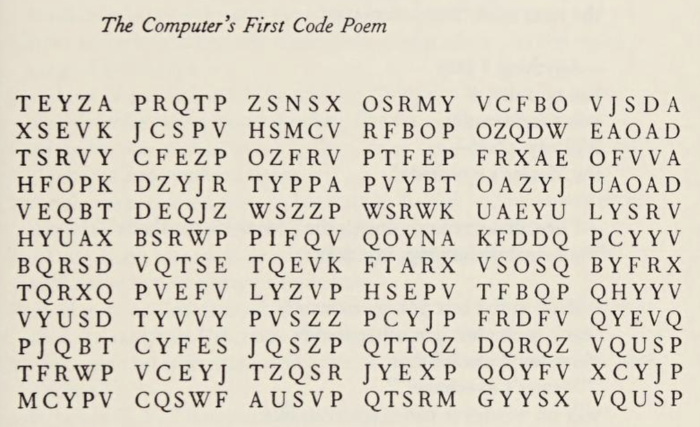
Despite what the title may imply, Morgan didn't actually program a computer to produce the poem. (Nor did he have the Loch Ness Monster pen "The Loch Ness Monster's Song" in the same collection.) However, the poem really is in code, as he later explained:
I didn't bother to try to crack the code. Instead, I found someone online (Nick Pelling) who had done it. Apparently it's a simple letter-substitution code, which produces:
dirty whist fight numbs black rebec
pinto hurls bdunt spurs under butte
fubsy clown posse stomp below xebec
tramp crawl kills kinky xerox joint
foxed minks squal above yucca shoot
manic tapir party upend tibia mound
panda strut jolts first pumas afoot
toxic potto still shows uncut aorta
swamp houri wails appal canal taxis
punks throw plain words about dhows
ghost haiku exits aping zooid taxis
That's not much more intelligible than the original poem. Pelling speculates that we can't rule out the possibility of a second hidden message within the first message.
Posted By: Alex - Sun Apr 28, 2024 -
Comments (1)
Category: Codes, Cryptography, Puzzles, Riddles, Rebuses and Other Language Alterations, Computers, Poetry
Miss Stacked Job
As far as I can tell, the term "stacked job" (as it was used in 1960s-era computing) was roughly equivalent to what today would be called 'batch processing'. It was a stack of jobs (or programs) to be run by the computer.When the Northern Arizona University Data Processing Club came up with the idea of awarding a young woman the title of "Miss Stacked Job," they admitted, "We didn't know how many, if any, girls would want the title." They ended up with ten contestants. Kathe Kline was the winner.
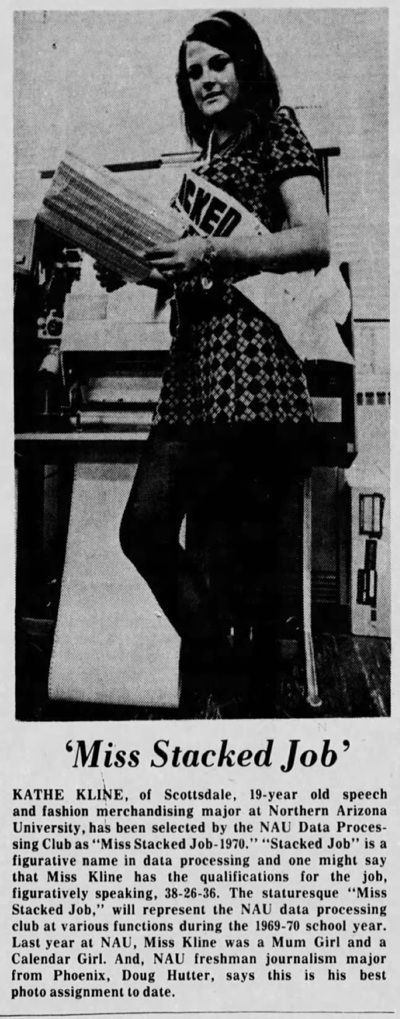
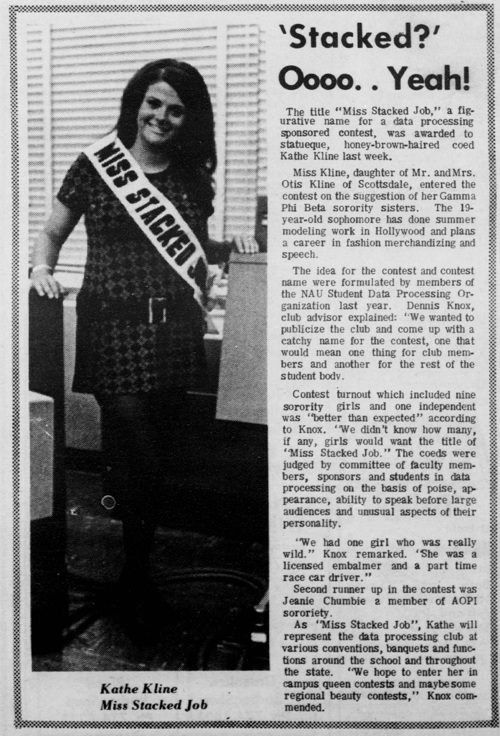
Posted By: Alex - Fri Jan 19, 2024 -
Comments (0)
Category: Awards, Prizes, Competitions and Contests, Computers, 1960s
The Honeywell Kitchen Computer
In 1969, Neiman Marcus offered a Honeywell "kitchen computer" in its Christmas catalog. The price tag was $10,600, which is equivalent to about $80,000 today. The price included a two-week course in programming, which was required to know how to use the computer. The computer could supposedly store recipes and help housewives plan meals.No one ever bought one. Or rather, no one ever bought the "kitchen computer," but a few people (engineers, and the like) did buy the H316 minicomputer, which is what the kitchen computer really was. Neiman Marcus and Honeywell had simply repackaged the H316 as a kitchen computer.
Nevertheless, the "kitchen computer" is now credited as being the very first time a company had offered a home computer for sale. One of them is on display at the Computer History Museum.
More info: wikipedia
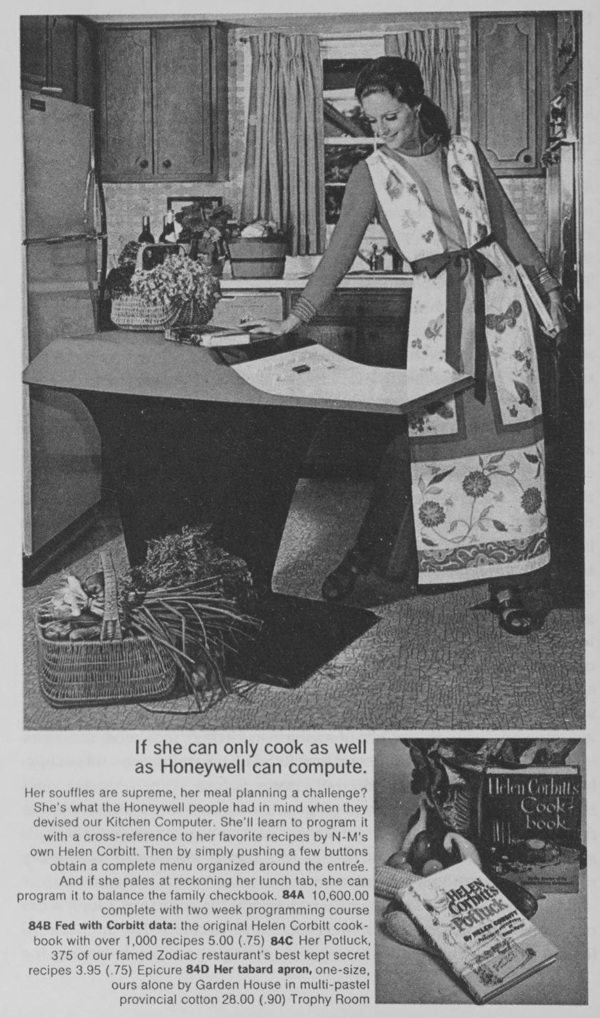
image source: Divining a Digital Future, by Paul Dourish and Genevieve Bell
If someone had bought one of the kitchen computers, it would have been pretty much unusable, because a user had to communicate with it in binary code, using a series of 16 buttons on the front to enter data. From Wired:
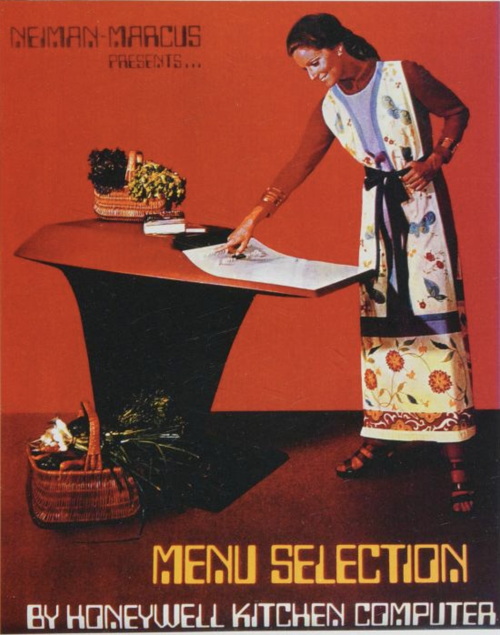
image source: The Computer, by Mark Frauenfelder
Posted By: Alex - Wed Nov 22, 2023 -
Comments (5)
Category: Technology, Computers, 1960s
Opti-onics, the Technology of the Future
I suppose this came true, if you can say your phone and tablet use something vaguely similar to Opti-onics!Go to source to enlarge the text for reading.
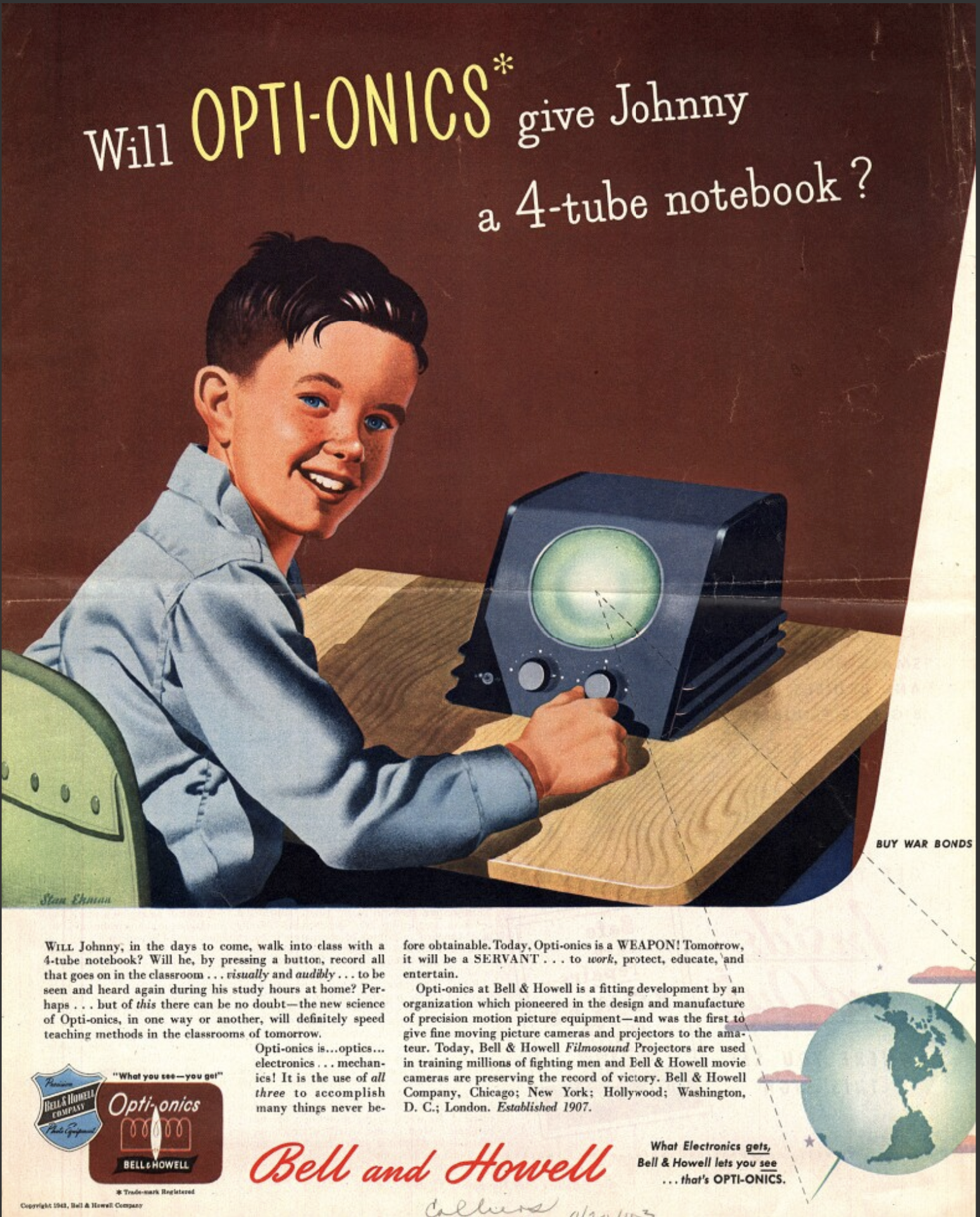
Posted By: Paul - Sun May 07, 2023 -
Comments (3)
Category: Technology, Computers, 1940s, Yesterday’s Tomorrows
Miss Formula
Miss Formula, who made her debut in 1964, was said to be "a computer's idea of how the perfect female should look." Though she was actually what the engineers at California Computer Products, Inc. thought the perfect female should look like. They designed her and the computer printed her out.California Computer Products (CalComp) was eventually acquired by the Lockheed Corporation. I wonder if Miss Formula still resides somewhere in their computer systems.
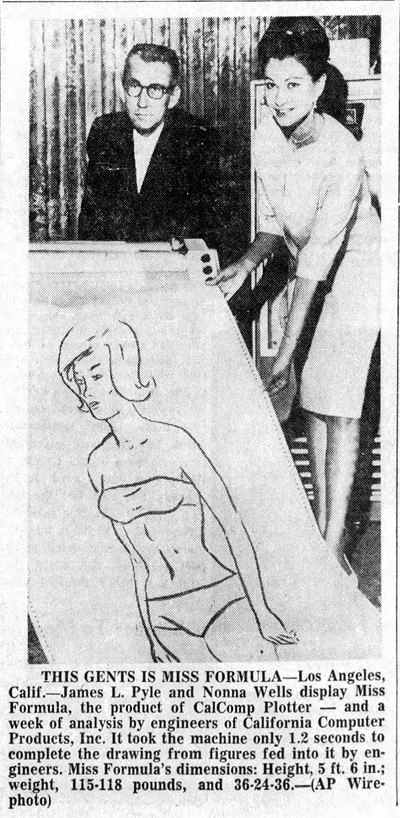
Tampa Tribune - July 31, 1964
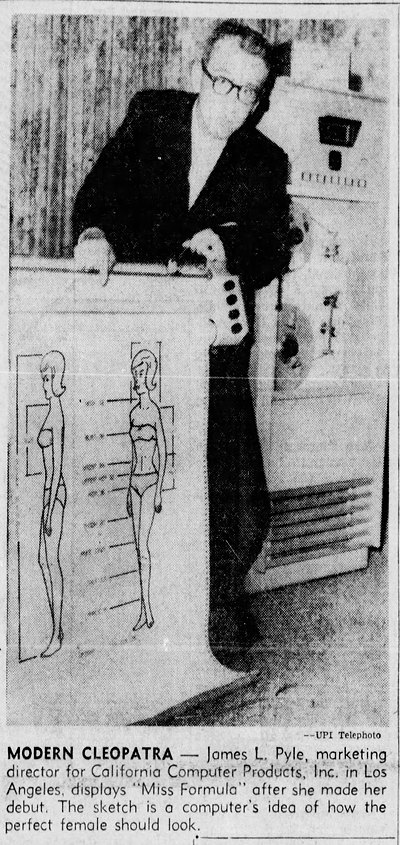
Pittsburgh Press - July 29, 1964
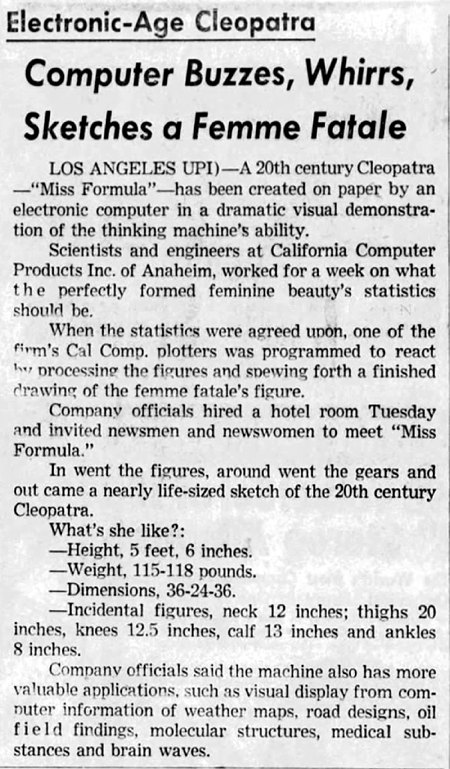
Pomona Progress-Bulletin - July 29, 1964
Posted By: Alex - Fri Nov 25, 2022 -
Comments (4)
Category: Awards, Prizes, Competitions and Contests, Technology, Computers, 1960s
EMAG-3
I did a science fair project in high school, but I put so little effort into it that I'm now embarrassed thinking back on it. The topic I chose was "The Electrolysis of Water." I basically just had some electrodes splitting water into hydrogen and oxygen.David Ecklein, however, had an extraordinary high school science fair project. Back in 1959, he built a computer, which he named EMAG-3, that was capable of playing "an interesting and reasonable game" of checkers. It was made from 3200 vacuum tubes and three miles of wiring. It stood 15 feet tall.
On his website, he notes that he designed it to fit the science fair floor space requirements, knowing that the regulations had omitted to mention anything about how high a project could be. Height restrictions were introduced the following year.
More info: MIT Museum

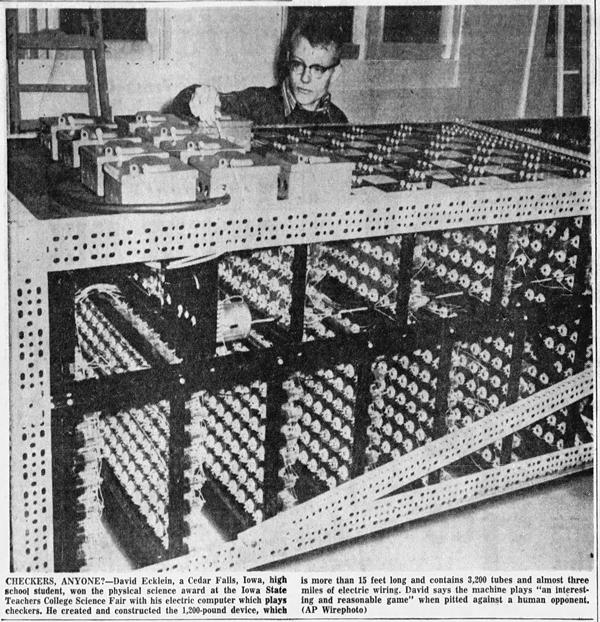
Great Falls Tribune - Apr 17, 1959
Posted By: Alex - Tue Sep 13, 2022 -
Comments (6)
Category: School, Technology, Computers, 1950s
International Society for the Abolition of Data-Processing Machines
The International Society for the Abolition of Data-Processing Machines (or ISADAPROM) was founded by Harvey Matusow in the late 1960s. Its aim was "to conduct guerrilla warfare against the computer by such means as sending a penny too much or too little when paying a utility bill."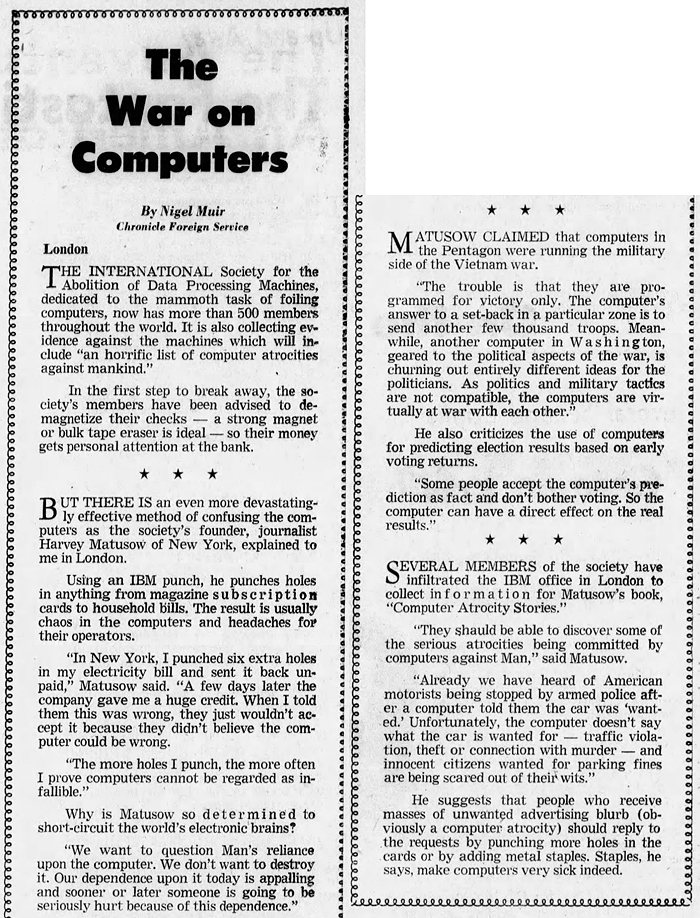
San Francisco Examiner - Oct 27, 1968
Matusow also authored The Beast of Business, which was supposed to serve as a manual for the guerrilla warfare against the computer. I wonder if any of the techniques he detailed would still work today?

However, Matusow is best known for giving evidence in court against individuals during the McCarthy era. Later he claimed that the FBI had paid him to give false testimony, and he detailed these allegations in his book False Witness.
He seems to have had a rather eccentric life and career. Some other highlights of it, from the University of Sussex's page about him:
- Founded a band called the Harvey Matusow’s Jew’s Harp Band
- Married approximately twelve times
- Is possibly part of the reason The Beatles broke up – he held the party where John Lennon met Yoko Ono
- Worked as a children’s TV clown called Cockyboo in Tucson, Arizona
- Converted to Mormonism and spent his last years known as Job Matusow
Posted By: Alex - Sat May 29, 2021 -
Comments (7)
Category: Clubs, Fraternities and Other Self-selecting Organizations, Technology, Computers, 1960s
Butler In A Box
Before there was Alexa or Google Voice, there was the Butler In a Box. It was invented in the early 1980s by Gus Searcy, a professional magician, with help from Franz Kavan, a computer programmer. In response to voice commands it could control connected household devices. So, it could operate the lights, turn on the heat, make a phone call, etc.About 9000 of them were reportedly sold. But at around $1500, the gadget was too expensive. Plus, the voice recognition was somewhat buggy. By the early 1990s they were off the market, but there's still some of them for sale on eBay.
More info: Popular Science (Mar 1987), vcfed.org

Austin American-Statesman - Aug 6, 1989
Posted By: Alex - Fri Jan 29, 2021 -
Comments (1)
Category: Technology, Computers, 1980s

| Who We Are |
|---|
| Alex Boese Alex is the creator and curator of the Museum of Hoaxes. He's also the author of various weird, non-fiction, science-themed books such as Elephants on Acid and Psychedelic Apes. Paul Di Filippo Paul has been paid to put weird ideas into fictional form for over thirty years, in his career as a noted science fiction writer. He has recently begun blogging on many curious topics with three fellow writers at The Inferior 4+1. Contact Us |




